OMAR ABUSAADA
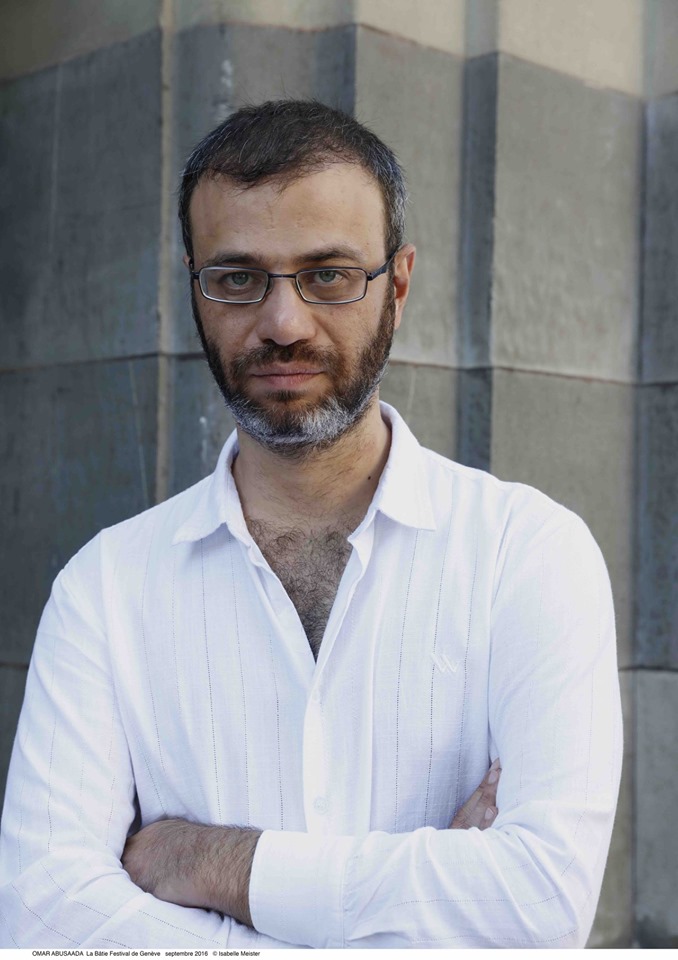 An independent Syrian playwright who lives and works in Damascus. After finishing his theatrical studies at the Higher Institute for Dramatic Arts in Damascus, he starts to build his own vision of a politically and socially-conscious theatre. Working as a playwright and director, he co-founds the Studio Theatre in 2002, whose first show, „Insomnia”, premieres in 2004. Abusaada then directs „El affich – Forgiveness” (2006), based on improvisations with a group of inmates from a youth detention centre, „Almirwad wa almikhala” (2009), „Look at the Streets… This is What Hope Looks Like” (2011) and „Could You Please Look into the Camera?” (2012). His most recent piece „While I was Waiting”, premieres in Kunsten Festival, Brussels in 2016, and is selected for the official programme of the 70th edition of Festival D’Avignon. He spends years travelling the remotest regions of Syria, Egypt, and Yemen, performing shows on marketplaces that are often pretexts to talk with with local students, workers and villagers, who sometimes join the actors onstage.For his most recent play, the director also works together with the Syrian author Mohammad Al Attar. Their performances take place on the boundary between dramatization and documentation. They condense the travails of war and show what it means to endure them. They have completed their theatrical trilogy, which is dedicated to the lives of women seeking refuge from war. Following the adaptation of „Trojan Women” (2013) in Jordan by Abusaada, Al Attar joined him for the second part of „Antigone of Shatila” (2014) in Lebanon. The long-awaited „Iphigenia” now follows at Volksbühne Tempelhof.
An independent Syrian playwright who lives and works in Damascus. After finishing his theatrical studies at the Higher Institute for Dramatic Arts in Damascus, he starts to build his own vision of a politically and socially-conscious theatre. Working as a playwright and director, he co-founds the Studio Theatre in 2002, whose first show, „Insomnia”, premieres in 2004. Abusaada then directs „El affich – Forgiveness” (2006), based on improvisations with a group of inmates from a youth detention centre, „Almirwad wa almikhala” (2009), „Look at the Streets… This is What Hope Looks Like” (2011) and „Could You Please Look into the Camera?” (2012). His most recent piece „While I was Waiting”, premieres in Kunsten Festival, Brussels in 2016, and is selected for the official programme of the 70th edition of Festival D’Avignon. He spends years travelling the remotest regions of Syria, Egypt, and Yemen, performing shows on marketplaces that are often pretexts to talk with with local students, workers and villagers, who sometimes join the actors onstage.For his most recent play, the director also works together with the Syrian author Mohammad Al Attar. Their performances take place on the boundary between dramatization and documentation. They condense the travails of war and show what it means to endure them. They have completed their theatrical trilogy, which is dedicated to the lives of women seeking refuge from war. Following the adaptation of „Trojan Women” (2013) in Jordan by Abusaada, Al Attar joined him for the second part of „Antigone of Shatila” (2014) in Lebanon. The long-awaited „Iphigenia” now follows at Volksbühne Tempelhof.
MOHAMMAD AL ATTAR
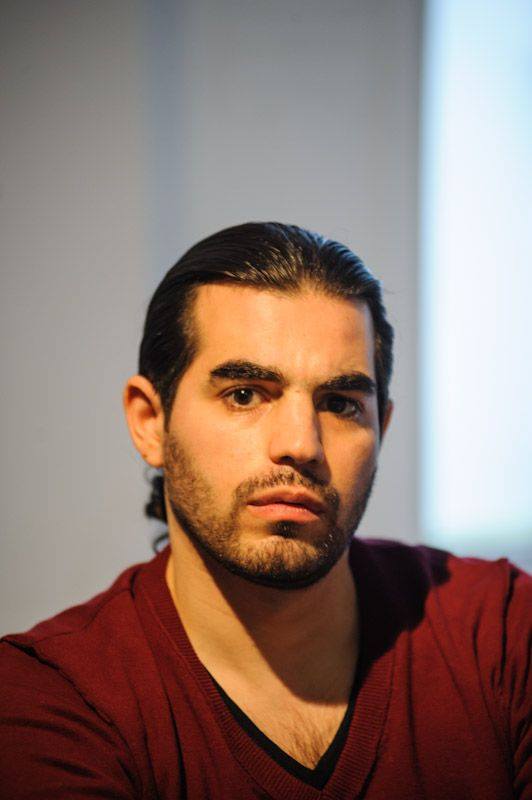
The Syrian playwright, who has been dealing with the Syrian Revolution and the resulting conflicts since 2011. Al Attar was born in Damascus in 1980. At university, he completed a degree in literature, followed by a master’s degree in applied theatre at London’s Goldsmiths University. Today, he is considered an important chronicler of war-torn Syria and lives in Berlin. Shortly before the outbreak of protests in Syria, he wrote the play „Withdrawal” – a chamber play staged in a small Damascus apartment where a couple live and find refuge from the social control mechanisms of society. In 2011, after the first large wave of arrests in the country, his play „Could You Please Look into the Camera?” followed. In it, torture experiences are relayed directly into a camera. The pieces „Withdrawal” (2007), „Look at the Streets… This is What Hope Looks Like” (2011), „Online” (2011), „Could You Please Look into the Camera?” (2012) „A Chance Encounter” (2013), „Youssef Was Here” (2013) have been shown on various international stages and festivals. His play „While I was Waiting”, premiered at the Kunsten Festival, Brussels in 2016, and was selected for the official programme of the 70th edition of Festival D’Avignon. For his two most recent plays, the director has joined forces with the Syrian author Mohammad Al Attar. Their performances take place on the boundary between fiction and documentation. They condense the travails of war and show what it means to endure them. They have completed their theatrical trilogy dedicated to the lives of women seeking refuge from war. Following the adaptation „Trojan Women” (2013) in Jordan and „Antigone of Shatila” (2014) in Lebanon the long-awaited „Iphigenia” has been performed at Tempelhof, Berlin, as well as on the Main Stage of Volksbühne during the season 2017/18.
BISSANE AL SCHARIF
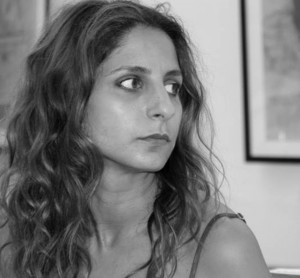 She was born in Paris 1977, graduated from the faculty of Architecture at Damascus University in 2001. Then studied Set Designing (Scenography) in the Department of Graduate Studies at the School of Architecture in Nantes and graduated in 2005. She was lucky to be guided and trained by passionate and experienced professors in theatre, cinema, exhibitions, and museums designing, and tried to use these different skills that She obtained from studying and work experiences in different art fields. This background enables her to be part of individual experiences such as designing exhibitions and art installation and with collective artists as a theatre designer. In 2005 Bissane went back to Syria to start working at Damascus Opera House as a scenographer. At the same time, she created scenography designs for big events and theatre shows in Damascus and worked as well as a set decoration in many cinema movies. The different culture sources for to be born in France for Palestinian parents and growing up in Syria enriched her artistic view and gave her unique artistic vision a clear appearance in her working style, which gave her the opportunity to work in the Middle East and Europe. Since 2013, she lives in France and works as a scenographer an independent artist. She trying to develop her skills in the field of art-media. In 2016, she was awarded in France: The medal of knight, the order of arts and letters after her installation „Women Memories”. Her new installation project „Sham”, observing the city of Damascus from the view of its children, was presented at Cité nationale de l’histoire de l’immigration, Paris, in November 2017.
She was born in Paris 1977, graduated from the faculty of Architecture at Damascus University in 2001. Then studied Set Designing (Scenography) in the Department of Graduate Studies at the School of Architecture in Nantes and graduated in 2005. She was lucky to be guided and trained by passionate and experienced professors in theatre, cinema, exhibitions, and museums designing, and tried to use these different skills that She obtained from studying and work experiences in different art fields. This background enables her to be part of individual experiences such as designing exhibitions and art installation and with collective artists as a theatre designer. In 2005 Bissane went back to Syria to start working at Damascus Opera House as a scenographer. At the same time, she created scenography designs for big events and theatre shows in Damascus and worked as well as a set decoration in many cinema movies. The different culture sources for to be born in France for Palestinian parents and growing up in Syria enriched her artistic view and gave her unique artistic vision a clear appearance in her working style, which gave her the opportunity to work in the Middle East and Europe. Since 2013, she lives in France and works as a scenographer an independent artist. She trying to develop her skills in the field of art-media. In 2016, she was awarded in France: The medal of knight, the order of arts and letters after her installation „Women Memories”. Her new installation project „Sham”, observing the city of Damascus from the view of its children, was presented at Cité nationale de l’histoire de l’immigration, Paris, in November 2017.
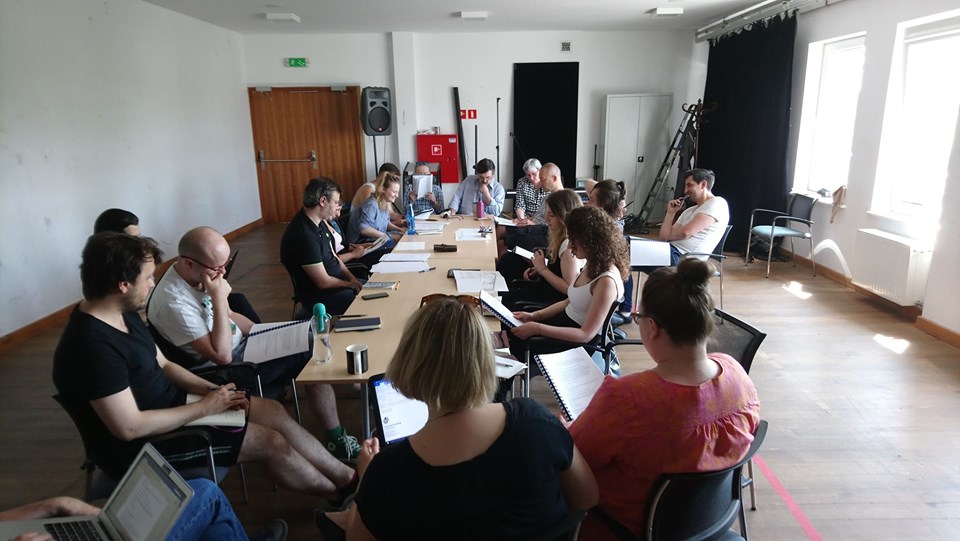
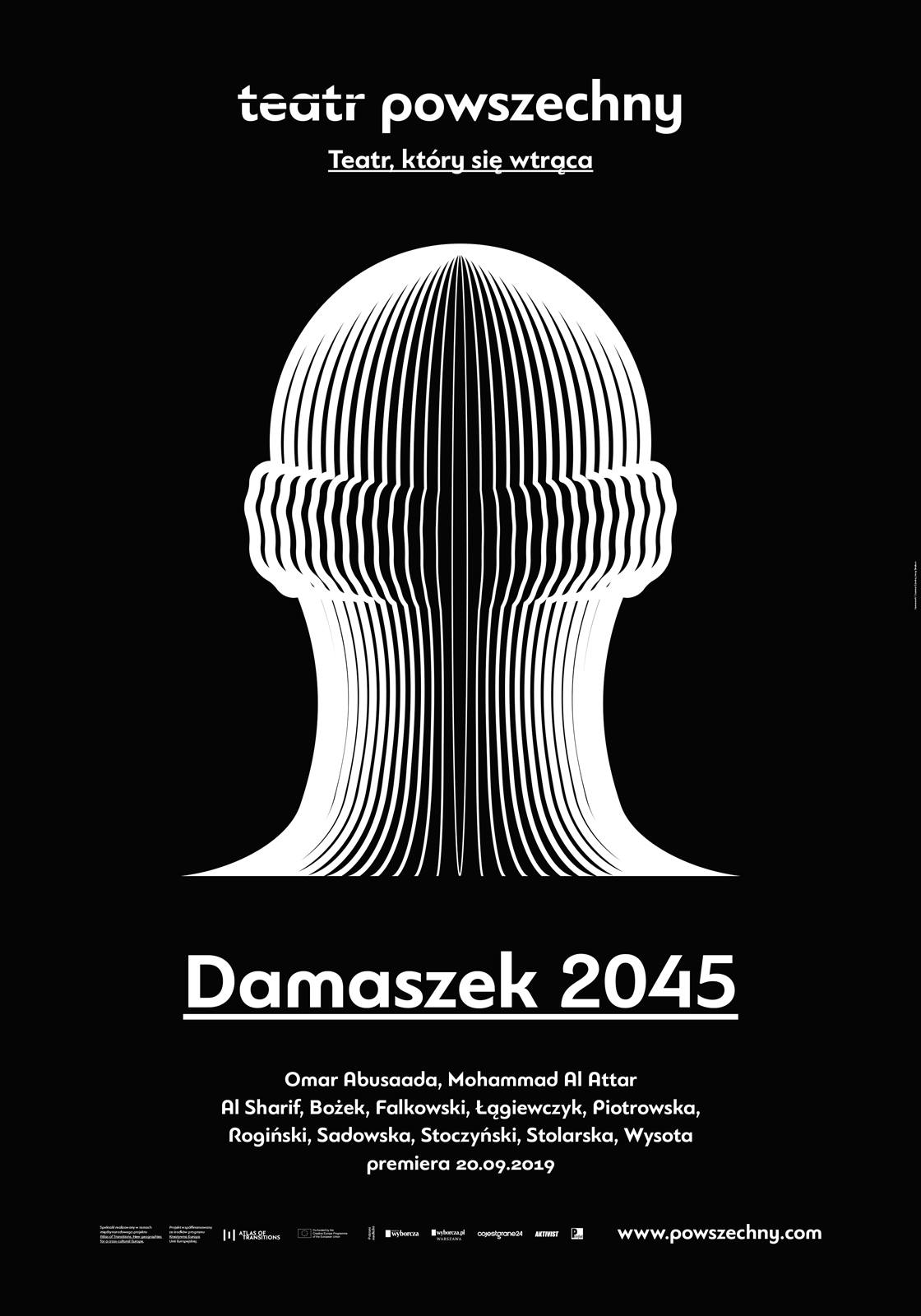




 An independent Syrian playwright who lives and works in Damascus. After finishing his theatrical studies at the Higher Institute for Dramatic Arts in Damascus, he starts to build his own vision of a politically and socially-conscious theatre. Working as a playwright and director, he co-founds the Studio Theatre in 2002, whose first show, „Insomnia”, premieres in 2004. Abusaada then directs „El affich – Forgiveness” (2006), based on improvisations with a group of inmates from a youth detention centre, „Almirwad wa almikhala” (2009), „Look at the Streets… This is What Hope Looks Like” (2011) and „Could You Please Look into the Camera?” (2012). His most recent piece „While I was Waiting”, premieres in Kunsten Festival, Brussels in 2016, and is selected for the official programme of the 70th edition of Festival D’Avignon. He spends years travelling the remotest regions of Syria, Egypt, and Yemen, performing shows on marketplaces that are often pretexts to talk with with local students, workers and villagers, who sometimes join the actors onstage.For his most recent play, the director also works together with the Syrian author Mohammad Al Attar. Their performances take place on the boundary between dramatization and documentation. They condense the travails of war and show what it means to endure them. They have completed their theatrical trilogy, which is dedicated to the lives of women seeking refuge from war. Following the adaptation of „Trojan Women” (2013) in Jordan by Abusaada, Al Attar joined him for the second part of „Antigone of Shatila” (2014) in Lebanon. The long-awaited „Iphigenia” now follows at Volksbühne Tempelhof.
An independent Syrian playwright who lives and works in Damascus. After finishing his theatrical studies at the Higher Institute for Dramatic Arts in Damascus, he starts to build his own vision of a politically and socially-conscious theatre. Working as a playwright and director, he co-founds the Studio Theatre in 2002, whose first show, „Insomnia”, premieres in 2004. Abusaada then directs „El affich – Forgiveness” (2006), based on improvisations with a group of inmates from a youth detention centre, „Almirwad wa almikhala” (2009), „Look at the Streets… This is What Hope Looks Like” (2011) and „Could You Please Look into the Camera?” (2012). His most recent piece „While I was Waiting”, premieres in Kunsten Festival, Brussels in 2016, and is selected for the official programme of the 70th edition of Festival D’Avignon. He spends years travelling the remotest regions of Syria, Egypt, and Yemen, performing shows on marketplaces that are often pretexts to talk with with local students, workers and villagers, who sometimes join the actors onstage.For his most recent play, the director also works together with the Syrian author Mohammad Al Attar. Their performances take place on the boundary between dramatization and documentation. They condense the travails of war and show what it means to endure them. They have completed their theatrical trilogy, which is dedicated to the lives of women seeking refuge from war. Following the adaptation of „Trojan Women” (2013) in Jordan by Abusaada, Al Attar joined him for the second part of „Antigone of Shatila” (2014) in Lebanon. The long-awaited „Iphigenia” now follows at Volksbühne Tempelhof.
 She was born in Paris 1977, graduated from the faculty of Architecture at Damascus University in 2001. Then studied Set Designing (Scenography) in the Department of Graduate Studies at the School of Architecture in Nantes and graduated in 2005. She was lucky to be guided and trained by passionate and experienced professors in theatre, cinema, exhibitions, and museums designing, and tried to use these different skills that She obtained from studying and work experiences in different art fields. This background enables her to be part of individual experiences such as designing exhibitions and art installation and with collective artists as a theatre designer. In 2005 Bissane went back to Syria to start working at Damascus Opera House as a scenographer. At the same time, she created scenography designs for big events and theatre shows in Damascus and worked as well as a set decoration in many cinema movies. The different culture sources for to be born in France for Palestinian parents and growing up in Syria enriched her artistic view and gave her unique artistic vision a clear appearance in her working style, which gave her the opportunity to work in the Middle East and Europe. Since 2013, she lives in France and works as a scenographer an independent artist. She trying to develop her skills in the field of art-media. In 2016, she was awarded in France: The medal of knight, the order of arts and letters after her installation „Women Memories”. Her new installation project „Sham”, observing the city of Damascus from the view of its children, was presented at Cité nationale de l’histoire de l’immigration, Paris, in November 2017.
She was born in Paris 1977, graduated from the faculty of Architecture at Damascus University in 2001. Then studied Set Designing (Scenography) in the Department of Graduate Studies at the School of Architecture in Nantes and graduated in 2005. She was lucky to be guided and trained by passionate and experienced professors in theatre, cinema, exhibitions, and museums designing, and tried to use these different skills that She obtained from studying and work experiences in different art fields. This background enables her to be part of individual experiences such as designing exhibitions and art installation and with collective artists as a theatre designer. In 2005 Bissane went back to Syria to start working at Damascus Opera House as a scenographer. At the same time, she created scenography designs for big events and theatre shows in Damascus and worked as well as a set decoration in many cinema movies. The different culture sources for to be born in France for Palestinian parents and growing up in Syria enriched her artistic view and gave her unique artistic vision a clear appearance in her working style, which gave her the opportunity to work in the Middle East and Europe. Since 2013, she lives in France and works as a scenographer an independent artist. She trying to develop her skills in the field of art-media. In 2016, she was awarded in France: The medal of knight, the order of arts and letters after her installation „Women Memories”. Her new installation project „Sham”, observing the city of Damascus from the view of its children, was presented at Cité nationale de l’histoire de l’immigration, Paris, in November 2017.